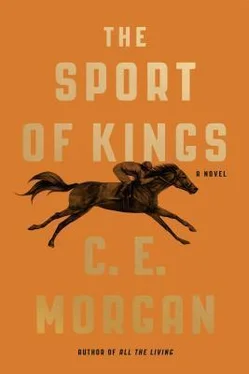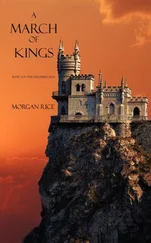“And there’s a market for this…?” she said.
“Pity for it anyway.”
Now it was her turn to laugh. Then she said softly, as if to herself, “Seems like we ought to have old tools like that around.”
“Farm girl?” he said.
“Yeah.”
“But rich.”
She blinked in surprise. “I guess so,” she said. “So what?”
“So nothing.” He turned back to the bar and drained his drink, knocking the bottle back down to the wood. He looked at her and with that not unkind, expressionless face, he sighed and said, “You can come to my place if you want.”
“Okay,” she said. She hadn’t brought her pride along with her.
“But I live all the way down in Jackson County.”
“I don’t care,” she said with a shrug, and there was such an inadvertent tone of despondency in her voice that she didn’t hear but he couldn’t miss, that he instinctively offered her his hand to help her off the stool.
* * *
In the morning she awoke on an old mattress on the floor with the warm sun striking her full across the face. In an instant, her heart was roused to panic. Somehow she had fallen asleep and slept through the night, a mishap she’d never made before. She always, always went home to her father. An extraordinarily heavy arm was now flung across her midsection. She slid sideways along the sheets to free herself, heart pounding. She snatched up her clothes and escaped to the living room with a thought to dressing in private away from this stranger still sleeping. Through the sun-silty windows dressed in faded patchwork, she saw pastures of cows and what looked like a lone goose wandering open-beaked through the yard under an enormous pass of sky, strenuously blue. The house around her was a musty old inherited thing, and while it was not clean, it was tidy. Everything looked to have been found in a garage sale or secondhand shop, except for the bookshelves, which she saw, upon closer inspection, were planed by hand. They had not been further sanded down, so the hard hairs of wood sprang up spikily from the natural grain. On these shelves, poetry books were lined and stacked. The uppermost spines grazed the ceiling. She forgot herself and was reaching to pull a volume from the shelf when a voice called, “Lady, what are you doing in there?”
She turned at the sound, irritated that the man had woken. In an instant, she remembered the expression on his face when they’d had sex — not surprise exactly, but a pleasant mystification, as if he couldn’t quite figure how he’d ended up in such a pleasant spot. He had been a gentle man; she was not accustomed to that.
She walked back to the bedroom door, stepping into her jeans on the way and tugging her shirt hurriedly down across her chest.
“You’re dressed,” he said.
“I have to go home. I slept late.”
He sat up very quickly but he didn’t say anything, just looked at her.
“What?” she said.
“Are you married?”
“No!” she said. “But I have to go.”
“Why are you going? I could make you some breakfast.”
She didn’t answer, she just turned to walk through the door again, pausing momentarily to tuck her shirt into her jeans. There were photos and magazine clippings taped to the gray plastered wall by the light switch. Photos of a black-haired couple from the 1950s. A series of yellowed shots of a coal train passing by the photographer, the images shaky and ghostly blurred. A few photographs looked to have been taken in a desert setting. The young man in the photograph had short black hair and a military uniform. There were no lines on his face, but it was unmistakably the same man she’d just spent the night with — twenty years and twenty pounds ago. The same distinctly broad nose that reminded her somehow of her neighbor Ginnie Miller. Vaguely leonine.
“What made you go in the army?” she asked suddenly.
After a pause, during which it sounded as if he might not reply at all, he said, “I was a marine.”
“Why’d you enlist?”
“I was dumb,” he said flatly.
“I’m serious.”
“I am too.” She glanced at him. He sighed and laid a meaty forearm over his forehead, so he couldn’t see anything but his own self-made darkness. “I don’t know,” he said, “it’s just what you did around here. I think I had a hero complex when I was a kid.”
She’d forgotten her need to leave. She stood there in wrinkled clothes with her arms hanging at her sides, so that she looked not so different — he would have seen if he’d looked — from a freshly woken child.
“Like…,” he said, and sighed again but with some irritation this time audible in the breath. “You grow up reading comic books and things, and you think you know what a hero is … that you have to save everybody … but then you grow up and you find yourself killing people just to follow orders. It’s like growing up means you cross some invisible line where all the rules get totally reversed. I guess that sounds sort of weird to say out loud … but it seemed original to me when I thought it.”
Henrietta was about to interject when he went on, “The worst thing, though, is killing’s not actually as hard as you think it’s going to be…” He made a quick trigger motion without taking his forearm from his eyes. “You think you’re going to be all messed up about it, but … I don’t know. They diagnosed me with PTSD. But sometimes, I almost feel like…”
“What?”
“I don’t know … I always get the feeling they want you to be more tore up than you really are, so people can feel okay around you. Nobody wants to know that it wasn’t actually that hard.”
She came to, realized the time. She said, “I do have to go.”
“Was it something I said,” he sighed, but she was already out the door.
Henrietta felt only dread at the thought of what Henry would say, but when she stepped from the porch, she’d seen the vast unfurling of Madison County to the west where the mountains dropped breathlessly away. Against her will, she walked past a stagnant-looking cattle pond, where cane sprouted up and cattails wagged in the smart morning wind as it raced toward the cliff like water at the edge of a waterfall. Her hair flew into her face. She passed an old tobacco barn, but there were no tobacco fields up here that she could see. A few spare, dark cattle. A deep, karsty sink that looked like a drained pond with boulders in its belly. The farm was situated at the top of such a precipitous drop that the earth seemed to penetrate the sky here. The clouds were as close as viewing gauze, and there was a frighteningly swift wind. She passed away from man-made markers, she passed trees that in their cliff clutching had over time grown wary and bent, as if the spiraling wind spoke through them of how precarious it is to live, cliff or no, how one day all the winds might by fate or chance converge in one place, maybe even this place, and send them all tumbling roots over fingertips, because the world was full of faceless, random happenings; or the love affair of earth and sky would end and the rain, their congress, would also end, so all the green family of life would starve and shrivel, their roots contracting and withering so that all the bodies would fall, senseless, cliff or no. So the trees bowed to the cliff’s lip, which also spoke. Henrietta could hear that. She approached the lip, felt the sickening lurch of open space. She edged gingerly onto a rock outcropping like a dais in a church with the annular remains of old trees petrified onto its ancient face. At this edge she peered over, her hair streaming ahead of her as if some part of her wanted to jump. Everything fell away, and the sky rode down a thousand feet like the falcon dropping. No ease here, toeing the crystalline seam of firmity and nothing. And the sense came, intuited perhaps for the first time, that the earth itself was predatory, inbuilt with dangers, and it suddenly made sense why people wanted to pave it and smother it and sell it to render it the simple past. Maybe they saw the beauty, maybe they could look out here to the west and admire the old knobs, the soft, bosomy remnants of the mountains, so lush in the soothing sunshine, but their genetic memory was far-reaching and wise and avenging. They knew the beauty of the earth rendered a fugue state, and while they gazed in blissful wonder, forgetting their own names and the names of their children, they froze in the Arctic chill and died of pustulent boils and rotting diseases, and sometimes they drowned or burned like bugs under glass or died of exposure, and some fell. So tamp the earth, burn the earth, pave the earth with abandon. Of course they did. Of course they would. It was their only revenge upon this wild, heartless theater.
Читать дальше
Конец ознакомительного отрывка
Купить книгу












